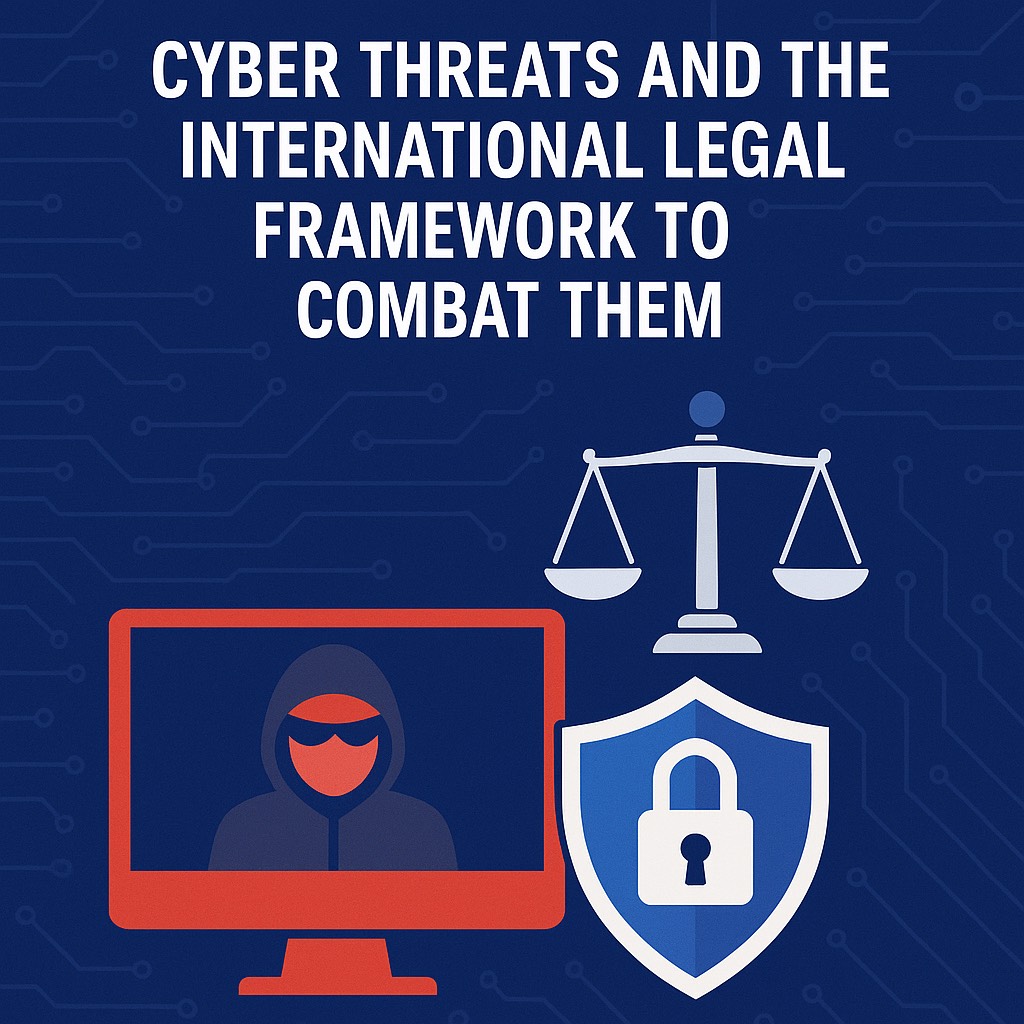CYBER THREATS AND THE INTERNATIONAL LEGAL FRAMEWORK TO COMBAT THEM
INTRODUCTION
In today’s digitalized and globalized world, technology permeates nearly every aspect of human life, from finance, economy, education to health and national security. While digital innovations have improved standards of living, they have also introduced significant threats, notably in the form of cybercrime. Modern cyber threats extend beyond hacking to include phishing, ransomware, identity theft, malware, cyberespionage, cyberterrorism, and insider threats.A cyber threat refers to any malicious act intended to steal, damage, or disrupt digital data and systems. Such threats may originate internally from trusted users or externally from unknown actors across the globe.
The cross-border nature of the internet challenges traditional jurisdiction and law enforcement, allowing cybercriminals to exploit gaps between legal systems. The 2015 BlackEnergy attack on Ukraine’s power grid, which was attributed to Russian hackers, demonstrated the devastating potential of cyberwarfare and the vulnerability of national infrastructure.
International regulation of this space is hindered by diverging national interests and legal frameworks. Some states emphasize national security through stricter controls, while others prioritize digital rights and privacy. These competing priorities complicate global consensus on cybersecurity governance. Addressing cyber threats requires a coordinated international response blending legal, technical, and institutional cooperation. Stronger cyber laws, better enforcement mechanisms, and a shared global cybersecurity culture are essential.
This article explores the growing complexity of cyber threats and critically examines international legal frameworks. It offers a comparative analysis of the cybersecurity laws of India, Bangladesh, and Nigeria highlighting their legal strengths, enforcement gaps, and alignment with global norms. By analyzing how these countries legislate and enforce digital protections, the article identifies key lessons and offers recommendations to strengthen national and regional legal infrastructures against cyber threats.
INTERNATIONAL LEGAL FRAMEWORKS ON CYBERSECURITY
The borderless nature of cyberspace necessitates international legal frameworks to harmonize laws, facilitate cooperation, and establish norms for responsible behavior. Below is an overview of the key international legal frameworks on cybersecurity, covering global and regional efforts, as well as the challenges and ongoing initiatives in this domain.
-
Global Legal Frameworks
Several global legal instruments have been developed to address cybersecurity, reflecting the need for a unified approach to tackling cyber threats.
a. Budapest Convention on Cybercrime (2001)
The Budapest Convention on Cybercrime, adopted by the Council of Europe in 2001, is the first and most significant international treaty addressing cybercrime (Budapest Convention). Open to accession by any country, it seeks to harmonize national laws, enhance investigative techniques, and promote international cooperation. The Convention covers offenses such as illegal access, data and system interference, and computer-related fraud. Articles 24 and 25 address extradition and mutual legal assistance, enabling cross-border enforcement. Despite its importance, the Convention has faced criticism for its limited scope and lack of universal ratification, with some countries advocating for a broader UN-led treaty.
b. United Nations Efforts
The United Nations (UN) has been a key player in shaping international norms for cybersecurity through the Group of Governmental Experts (GGE), established in 2004. The GGE’s 2013 report affirmed that existing international law, including the UN Charter, applies to cyberspace, emphasizing principles like sovereignty, non-intervention, and the prohibition of the use of force (UN GGE 2013). The 2015 report introduced voluntary, non-binding norms for responsible state behavior, such as protecting critical infrastructure and cooperating to prevent cybercrime (UN GGE 2015). However, efforts to develop a comprehensive UN convention on cybercrime have faced challenges. A draft proposed by the Russian Federation in 2017 lacked international consensus due to concerns over its scope and potential for misuse (UN Draft 2017).
c. General Data Protection Regulation (GDPR)
The General Data Protection Regulation (GDPR), enacted by the European Union in 2018, is primarily a data protection framework but has significant cybersecurity implications (GDPR). It unifies data protection laws across the EU and includes provisions that enhance cybersecurity, such as Article 32, which mandates appropriate technical and organizational measures for data security, and Article 33, which requires reporting of data breaches. The GDPR’s extraterritorial applicability affects organizations worldwide that process EU residents’ data, setting a global benchmark for data protection and cybersecurity practices.
2.Regional Legal Frameworks
Regional organizations have developed legal frameworks tailored to their specific contexts, complementing global efforts.
a. European Union (EU Cybersecurity Act)
The EU Cybersecurity Act, adopted in 2019, strengthens the EU’s cybersecurity capabilities by establishing a certification framework for ICT products and services and enhancing the role of the European Union Agency for Cybersecurity (ENISA) (EU Cybersecurity Act). The Act aims to ensure a high common level of cybersecurity across the EU, facilitating the internal market and protecting citizens and businesses. Key provisions include Articles 1 (objectives), 3 (ENISA tasks), and 7 (operational cooperation).
b. African Union and ECOWAS Conventions
The African Union (AU) Convention on Cyber Security and Personal Data Protection (2014) promotes the harmonization of laws and cooperation among member states to combat cybercrime and protect personal data (AU Convention). It calls for creating or amending national laws and facilitating mutual legal assistance and information sharing. Similarly, the ECOWAS Directive on Fighting Cybercrime (2011) requires member states of the Economic Community of West African States to criminalize cybercrime and support cooperation and extradition (ECOWAS Directive). ECOWAS also has conventions on mutual assistance and extradition to further these goals.
c. Arab League Convention
The Arab Convention on Combating Information Technology Offences (2010), adopted by the Arab League, aims to strengthen cooperation among Arab states to defend against and protect from cybercrime. It provides a framework for joint action and information exchange to address regional cyber threats.
d. Other Regional Efforts
The Shanghai Cooperation Organization’s Agreement on Cooperation in the Field of International Information Security (2010) extends beyond cybercrime to include information security and national control over systems and content. While less focused on cybersecurity per se, it reflects regional efforts to address digital threats collaboratively.
NIGERIA’S CYBER LEGAL FRAMEWORK
With the rise of digital transactions and online communication, Nigeria has witnessed an increase in cyber-related threats such as fraud, identity theft, and data breaches. To address these challenges, the government has developed a comprehensive legal framework aimed at preventing, prosecuting, and mitigating cybercrimes as seen by the enactment of the “Cybercrime [Prohibition and Prevention] Act,
-
CYBERCRIMES [PROHIBITION, PREVENTION, ETC.] [AMENDMENT] ACT, 2024
This is the primary legislation addressing cyber threats in Nigeria. Key provisions of this act are [sections 12, 14, 22].
i. It criminalizes cyber offences, e.g. hacking, identity theft, phishing, cyberterrorism.
ii. Stipulates appropriate sanctions for offenders, including imprisonment and fines.
iii. Mandates the protection of critical national information infrastructure [CNII].
iv. Requires financial institutions and telecoms companies to report cyber incident.
v. Establishes the NATIONAL CYBERCRIME ADVISORY COUNCIL for policy guideline.
Complementing this framework are:
- THE NIGERIA DATA PROTECTION ACT (2023): The act aims to protect the fundamental rights and freedom of data subjects, as guaranteed by the Nigerian constitution. It also establishes the Nigerian Data Protection Commission [NDPC] for enforcement.
2.NATIONAL CYBERSECURITY POLICY AND STRATEGY [NCPS] 2021
- Provides a strategic framework for enhancing cybersecurity.
- Focuses on public-private partnerships, capacity building, and international cooperation.
- ECONOMIC AND FINANCIAL CRIMES COMMISSION ACT 2004, & ADVANCED FEE FRAUD AND OTHER FRAUD-RELATED OFFENCES ACT, 2006 cover online scams [e.g., “Yahoo-Yahoo” fraud], Addresses and financial crimes.
Key Institutions Involved in Enforcement
- Office of the National Security Adviser [ONSA]: Coordinates National Cybersecurity Efforts.
- National Information Technology Development Agency [NITDA]: They Implement Cybersecurity Policies.
- EFCC & The Nigeria Police Cybercrime Unit- Investigate Cyber Fraud
- Nigeria Communications Commission
- Department Of State Security [DSS]
BANGLADESH’S CYBER SECURITY LEGAL ARCHITECTURE
With growing digitisation, Bangladesh has witnessed a sharp rise in cybercrimes, including data breaches, hacking, and online defamation. Ensuring cybersecurity and protecting digital rights requires a comprehensive legal and institutional framework. This article critically examines Bangladesh’s legal response to cyberthreats and identifies areas for reform.
Legal Instruments
The Information and Communication Technology Act 2006, amended in 2013, marked the first formal legislative attempt to combat cybercrime. It criminalised hacking, online defamation, and the publication of obscene content. However, section 57, which penalised publishing “false or obscene” content online, drew criticism for its vague wording and potential misuse against journalists and dissenters. The section allowed for imprisonment up to 14 years or a fine of Tk. 1 crore.[i] Due to growing criticism, section 57 was repealed and replaced.
The Digital Security Act 2018 (DSA) now serves as the primary legal framework. It defines offences such as hacking (s 17), cyber terrorism (s 19), and digital espionage (s 32). While comprehensive, the DSA has been criticised for overbroad terms like “propaganda” and “anti-state activities” (s 21), raising concerns about violations of free speech.[ii] International human rights groups, including Article 19 and Human Rights Watch, have condemned the act’s potential for arbitrary application.[iii]
The Bangladesh Telecommunication Act 2001, though not cybercrime-specific, allows state surveillance during national security threats (s 71). Furthermore, traditional criminal laws—like sections 499–500 of the Penal Code 1860—can be invoked in online defamation cases. The Evidence (Amendment) Act 2022 formally incorporated digital evidence under sections 3 and 65A of the Evidence Act 1872.
Penal Code, 1860 and Evidence Act, 1872
Traditional laws also apply to cybercrimes under certain conditions. For example:
- Section 499–500 of the Penal Code apply to online defamation.
- The Evidence (Amendment) Act, 2022 formally incorporates electronic evidence admissibility under section 3 and 65A of the Evidence Act.
Institutional Mechanisms
The Digital Security Agency, established under the DSA, enforces cybersecurity regulations. The BGD e-GOV CIRT manages incident responses and digital forensics. Meanwhile, the Cyber Tribunal in Dhaka handles cybercrime cases, but is plagued by capacity constraints.
INDIA’S CYBERSECURITY FRAMEWORK
India’s growing reliance on digital infrastructure driven by government digitization initiatives, widespread internet adoption, and economic digitization—has made cybersecurity a national priority. The cybersecurity framework in India is shaped by a combination of policies, legal statutes, and institutional structures aimed at securing cyberspace, protecting critical infrastructure, and safeguarding personal data. The foundational policy in this domain is the National Cyber Security Policy (NCSP) 2013, introduced by the Ministry of Electronics and Information Technology (MeitY). This policy outlined strategic objectives such as enhancing cyber threat intelligence, protecting critical information infrastructure, fostering public-private partnerships, and promoting cyber awareness. However, the rapid evolution of threats has rendered the 2013 policy outdated. Consequently, a National Cyber Security Strategy 2023 is being developed under the National Security Council Secretariat (NSCS) to address emerging challenges like AI-driven attacks, critical infrastructure vulnerabilities, and cyber warfare. India has also launched key initiatives including the Cyber Swachhta Kendra (botnet cleaning), Cyber Surakshit Bharat (CISO training), and the National Cyber Coordination Centre (NCCC) for real-time threat analysis. Additionally, awareness programs like the Information Security Education and Awareness (ISEA) initiative and national-level cyber drills such as Bharat NCX enhance cyber resilience and coordination
Legally, the backbone of India’s cybersecurity regime is the Information Technology Act, 2000, amended in 2008 to address cybercrimes and privacy issues. Key provisions include:
– Section 66: Addresses cyber offences like hacking and identity theft.
– Section 66F: Defines cyber terrorism.
– Sections 70–70B: Cover protection of Critical Information Infrastructure and establish authorities like CERT-In and NCIIPC.
– Section 72A: Penalizes unlawful disclosure of personal data.
– Sections 69 & 69A: Authorize information interception and website blocking under legal oversight
A major advancement came with the enactment of the Digital Personal Data Protection Act, 2023 (DPDP Act), which regulates digital personal data, ensures individual consent and rights, and establishes the Data Protection Board of India (DPBI) for compliance and grievance redressal. This brings India’s data protection norms closer to global standards such as the EU’s GDPR.
Sectoral regulators such as the Reserve Bank of India (RBI), SEBI, and IRDAI enforce cybersecurity norms within financial, securities, and insurance sectors, ensuring robust, industry-specific safeguards. Institutions like MeitY, CERT-In, NCIIPC, NCSC, and the Indian Cyber Crime Coordination Centre (I4C) form the operational and regulatory backbone for cybersecurity enforcement, incident response, and policy implementation.
A COMPARATIVE ANALYSIS OF STRENGTHS AND CONVERGENCES
In a rapidly digitalized era, cybercrime pose a serious threat and need to be addressed by developing a significant legal framework. India, Bangladesh and Nigeria have taken notable measures to formulate comprehensive legal and institutional frameworks to secure cyberspace amid growing borderless threats. Each has developed legal and institutional frameworks to combat cybercrime, ensure data protection, and promote cybersecurity.
India’s cybersecurity framework is significant for its multi-tiered, intricate and layered structure that integrates with national policy. Rooted in the Information Technology Act, 2000 (amended in 2008), India criminalizes a spectrum of cyber offences. The law also provides instruments to safeguard vital information infrastructure and execute personal data privacy.
The Digital Personal Data Protection Act, 2023 denotes substantial progress, corresponding with global privacy norm such as the European Union’s GDPR. Domain-specific framework such as those by the RBI, SEBI and IRDAI exhibit strategic approach in finance, stock markets and insurance.
India’s institutional framework is sound. Agencies like CERT In , NCIIPC and the National Cybersecurity Coordinator work in alliance with the Ministry of Electronics and Information Technology to forge robustness, manage cyber incidents and guide national cybersecurity strategy. The strengths of the Indian framework feature transforming legal regime for data protection based on rights. The roles and responsibilities of institutions are defined clearly. The imposition of cybersecurity is sector specific. The key features also include rapid threat response systems.
Bangladesh’s strategy to cyber law has advanced profoundly since the ICT Act 2006, which at the outset addressed cyber offences but was undermined by vague language and misuse particularly section 57 condemned constraining free speech. This was taken over by the Digital Security Act (DSA )2018 . The act now operates as the backbone of cybercrime regulation in Bangladesh.
The DSA criminalizes several cyber offences but invites criticism due to the ambiguous provisions that potentially violate upon freedom of speech and equip arbitrary arrests. The country has also delegated various institutions that showcase a vertical structure to deal with cyber issues like the Digital Security Agency, BGD e-GOV CIRT and the Cyber Tribunal. The shift from outdated laws to DSA and inclusion of digital evidence indicate advancement.
Nigeria’s Cybercrime (Prohibition, Prevention etc.) Act was recently amended in 2024. The act facilitates holistic legal cornerstone by addressing cyber offences such as hacking, identity theft and cyber terrorism. It directs the protection of Critical National Information Infrastructure (CNII) and mandates the financial and telecom institutions to report cyber incidents. Complementing the above framework Nigeria also has The Nigeria Data Protection Act (2023), National Cybersecurity Policy and strategy (NCPS) 2021 and the economic and Financial Crimes Commission Act 2004 that underscores global cooperation, capacity building and stakeholder collaboration.
Nigeria enables several institutions such as the Office of the National Security Adviser (ONSA), NITDA , EFCC and Police Cybercrime unit. The notable strengths of the Nigerian framework are reflected through the holistic coverage of cybercrimes, obligated corporate compliance from key domains and the development of institutional networks to tackle fraud.
All these countries criminalize identity theft, digital fraud, cyber terrorism and unauthorized access and have institutional framework for cybersecurity. India and Nigeria have a standalone Data Protection Act but Bangladesh is yet to introduce the same. All the countries have identified and acknowledge the importance of cross sectorial collaboration and cooperation to deal with the persisting challenges of cybersecurity amid the rising concerns.
The countries have made significant legal transitions in the arena of cybersecurity and signify distinct pathways and models to deal with cyber security governance. Constant revision and updates of laws, strengthening the institutions, striking a balance between regulation and rights, framework to combat cross border cybercrimes should be the areas of focus.
A partnership driven, unambiguous citizen centric approach will be significant to build robust and right based safe cyber space.
KEY FINDINGS ON GAPS AND RECOMMENDATIONS
The comparative assessment of India, Bangladesh, and Nigeria reveals that while significant progress has been made in establishing cybercrime legislation and national strategies, fundamental gaps persist in legal clarity, institutional coordination, and cross-border cooperation. These challenges are not isolated but reflect a broader global struggle to adapt traditional legal systems to the realities of a digitized and borderless world.
One of the most critical challenges is the absence of uniform definitions and legal standards for cybercrimes across jurisdictions. Cyber offences such as phishing, ransomware, hacking, and cyberterrorism are conceptualized and prosecuted differently, depending on the country’s legislative context. The lack of harmonization hinders international collaboration, extradition, and mutual legal assistance.
In Bangladesh, for example, the Digital Security Act 2018 contains vague and overly broad provisions. Section 25 criminalizes publishing information deemed “false,” “offensive,” or “threatening,” without clear legal definitions. Such ambiguity opens the door for misuse and infringes on fundamental rights such as freedom of expression. The arrest and alleged torture of cartoonist Ahmed Kabir Kishore, who criticized the government during the COVID-19 pandemic, exemplifies how imprecise laws can be weaponized.
India, despite being a digital hub, struggles with outdated legal instruments that fail to match the pace and complexity of modern cyber threats. The Information Technology Act of 2000, while foundational, requires frequent updating and stronger inter-agency collaboration to deal with the evolving nature of cybercrime.
Nigeria, although equipped with a comprehensive Cybercrimes Act (2015) and a National Cybersecurity Policy and Strategy (NCPS), still battles with weak enforcement due to capacity constraints, limited technical expertise, and poor public awareness. Law enforcement and judiciary actors often lack the specialized training to handle digital evidence, while financial and infrastructural constraints hinder rapid response and forensics.
Across all three jurisdictions, a major obstacle is the jurisdictional complexity inherent in cybercrime. Virtual crimes often span multiple countries, challenging the territorial nature of criminal law. Differing standards of digital evidence admissibility, cooperation protocols, and prosecution thresholds further delay justice and impede global cybercrime suppression.
Recommendations
- There is need for a revision and harmonization of existing cybercrime laws to provide precise, non-ambiguous definitions of cyber offences. Harmonization of legal standards and raising cybersecurity awareness globally will also contribute significantly towards enhancing resilience against cyber threats. In other words, combating cybercrime will require nothing less than an approach involving further strengthening of international legal frameworks, enhancement of cooperation among global law enforcement agencies, and leveraging relevant technological developments.
- The lack of uniformity in defining cybercrimes and their prosecution makes things tough regarding international cooperation. In this regard, future efforts have to be done to bring national laws into line with international standards in order to avoid many discrepancies in this context and to facilitate cross-border legal processes smoothly. While updating of national cyber security laws is proposed, there should multi sectoral participation and also efforts made to ensure its alignment with international conventions such as the Budapest Convention or regional agreements like the Malabo Convention (for African states).
- Countries must Invest in Specialized Training and continuous Capacity Building workshops law enforcement agents, prosecutors, judges, and digital forensic experts. The components of technology law and cybersecurity should be included into the curricula of law schools.
- National cybercrime units should be well equipped with modern tools for evidence collection, analysis, and secure storage. Develop protocols should be developed for real-time detection and response, especially for critical infrastructure protection.
- Finally, there must be increased cybersecurity education and awareness of importance globally. As cyber threats evolve further, one of the most important things will be educating law enforcement, policy makers, and the general public on best cybersecurity practices and emerging threats. This, through comprehensive training programs and awareness creation, will build resilience to cyber threats and enhance cybersecurity posture. National awareness campaigns on cyber safety, phishing, identity theft, and digital privacy should be launched by countries to raise awareness on cyber threats.
CONCLUSION
In conclusion, combating cyber threats in the digital age requires more than just cyber laws, it demands a proactive, harmonized, and modernized legal ecosystem. Countries like India, Bangladesh, and Nigeria must not only reform their laws but also build institutions, empower citizens, and strengthen international cooperation. Only then can national sovereignty, public trust, and global digital security be safeguarded.
REFERENCES
Brenner, Susan W., and Leo L. Clarke. 2005. Distributed Security: Preventing Cybercrime. John Marshall Journal of Computer & Information Law, 23, no. 4: 659-709.
Calderoni F, ‘The European Legal Framework on Cybercrime: Striving for an Effective Implementation’ (2010) 54 Crime, Law and Social Change 339
Ukhami, E. I., & Abdulsalam, D. (2024). GLOBALISATION AND NATIONAL SECURITY: PERSPECTIVES ON CYBERSECURITY THREATS IN NIGERIA. Journal of Political Discourse, 2(1 (2), 273–286. Retrieved from https://jopd.com.ng/index.php/jopdz/article/view/130
Adeyemi, A. S. (2022). Cybersecurity law in Nigeria: Gaps and solutions. Journal of African Law, 66(2), 215–234. https://doi.org/10.1017/S002185532200012X
Osho, B., & Adekunle, Y. (2023). The Department of State Services and cybersecurity enforcement in Nigeria. African Journal of Criminology, 17(1), 45–63.
Chaikin, David. 2006. Network investigations of cyberattacks: The limits of digital evidence. Crime, Law and Social Change, 46, no. 4-5: 239-56.
CISA, ‘Cyber-Attack against Ukrainian Critical Infrastructure’ (Cybersecurity and Infrastructure Security Agency20 July 2021) <https://www.cisa.gov/news-events/ics-alerts/ir-alert-h-16-056-01> accessed 8 June 2025
Cybersecurity and International Law: Addressing Global Challenges in Cyberspace (theimpactlawyers.com5 March 2024) https://theimpactlawyers.com/articles/cybersecurity-and-international-law-addressing-global-challenges-in-cyberspace
https://eng.sectsco.org/files/207508/207508
https://www.onlinelibrary.iihl.org/wp-content/uploads/2021/05/2017-Tallinn-Manual-2.0.pdf
Human Rights Watch, ‘Bangladesh: Repeal Abusive Law’ (HRW, 19 September 2018) https://www.hrw.org/news/2018/09/19/bangladesh-repeal-abusive-law accessed 6 June 2025
Indian Computer Emergency Response Team, CERT-In Charter & Mission (MeitY, June 2025) https://www.cert–in.org.in/s2cMainServlet?pageid=CHARTMISSION accessed 8 June 2025.
Lewis, James A. 2006. The Council of Europe Convention Entered into force January 2004. Http://www.csis.org/media/csis/pubs/060804_coecybercrime.pdf.
Li Y and Liu Q, ‘A Comprehensive Review Study of Cyber-Attacks and Cyber Security; Emerging Trends and Recent Developments’ (2021) 7 Energy Reports 8176 https://www.sciencedirect.com/science/article/pii/S2352484721007289> accessed 13 June 2025
National Cyber Security Policy 2013’ (India.gov.in, National Portal of India) https://www.india.gov.in/national–cyber–security–policy–2013 accessed 8 June 2025.
PRS Legislative Research, Digital Personal Data Protection Bill, 2023, Lok Sabha (2023) https://prsindia.org/files/bills_acts/bills_parliament/2023/Digital%20Personal%20Data% 20Protection%20Bill%2C%202023.pdf accessed 8 June 2025.
Rakha, N. A. (2024). Cybercrime and the Law: Addressing the Challenges of Digital Forensics in Criminal Investigations Smith, Russel G, Peter Grabosky, and Gregory Urbas. 2004. Cyber Criminals on Trial. Cambridge: Cambridge University Press
Researcher A, ‘Jailed under Digital Security Act, Bangladeshi Cartoonist Kabir Kishore Says He Was Tortured – Committee to Protect Journalists’ (Committee to Protect Journalists30 March 2021) <https://cpj.org/2021/03/jailed-digital-security-act-bangladeshi-cartoonist-kabir-kishore-tortured/> accessed 28 February 2025
Sarkar G and Shukla SK, ‘Behavioral Analysis of Cybercrime: Paving the Way for Effective Policing Strategies’ (2023) 2 Journal of Economic Criminology 100034
Singh T, ‘Cybercrime and International Law: Jurisdictional Challenges and Enforcement Mechanisms’ [2024] African Journal of Biomedical Research 697 https://doi.org/10.53555/AJBR.v27i3S.2101
Stoddart K, ‘Russia’s Cyber Campaigns and the Ukraine War: From the “Gray Zone” to the “Red Zone”’ [2024] Applied Cybersecurity & Internet Governance <https://doi.org/10.60097/ACIG/189358> accessed 11 November 2024
The Gazette of India, The Digital Personal Data Protection Act, 2023, No 22 of 2023 (11 August 2023) https://egazette.gov.in/WriteReadData/2023/248045.pdf accessed 8 June 2025.
Tunggal AT, ‘What Is a Cyber Threat?’ (Upguard17 August 2022) <https://www.upguard.com/blog/cyber-threat> accessed 8 June 2025
NAMES OF TEAM MEMBERS
- Aniekan Akpan – Introduction, Key findings and recommendations and conclusion
- Yuti – International legal frameworks on cybersecurity
- Ifeoluwa Florence Omonayin- Nigeria’s cyber legal framework
- Vibodh Singh – Cybersecurity in India
- Ekramul Haque – Bangladesh’s cyber security legal architecture
- Nandini Sen – A comparative analysis of strengths, gaps and convergences



